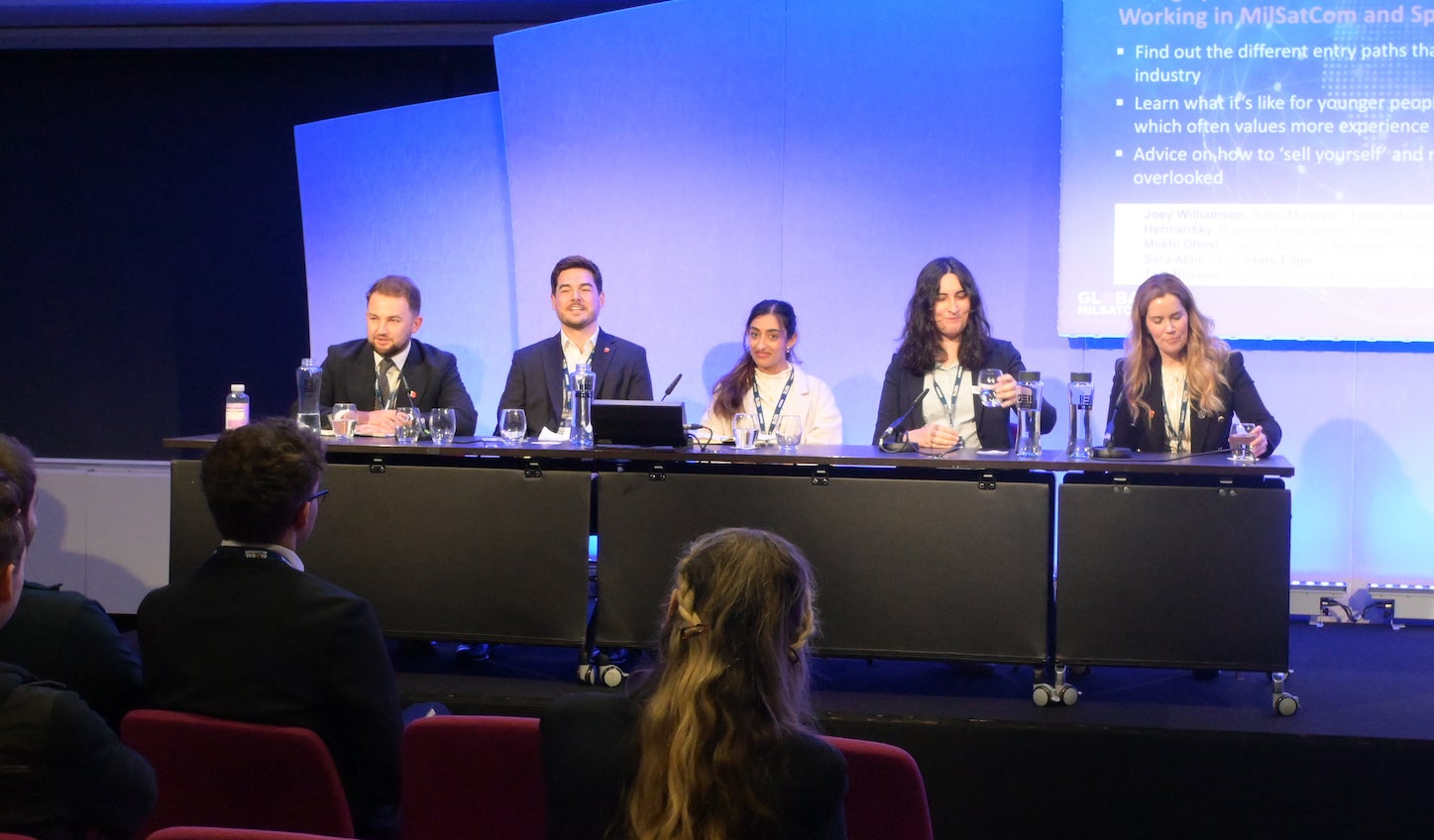Latest News

Young execs panel at Global MilSatCom in London. Photo: Via Satellite
With so much emphasis on attracting the next generation of leadership, young leaders in milsatcom talked about their career paths, perspective on the industry, and their advice for young people that want to move up in the satellite industry this week at Global MilSatCom in London.
Tara Browne, deputy division chief of strategy and plans for the U.S. Space Force Space Systems Command, said she previously worked in TV and film production for six years before winding up in an acquisitions program working for the U.S. Air Force. She advised other young professionals to put themselves out there for opportunities even if they do not think they are eligible.
“Networking at its core is about relationship building. Part of it is about being curious about people. Go for the long game,” Browne said. “Use events and networking events to meet people and ask questions. Be curious and authentic in your approach. Always apply [for a job] if you don’t think you are eligible. I did have some related experience and that was key.”
She also spoke about the need for doing research and being prepared. She added, “In terms of research, look at where the R&D dollars are going on. You should pay attention to the news, set up tickers, etc. In terms of the Space Force, we are looking at things like AI and quantum computing. These are huge. We are also looking at multi-orbit, multi-band technologies.”
Mekhi Dhesi, space situational awareness strategy lead for Astroscale UK, admitted when going into the space industry she didn’t know anything about space systems and engineering. One of the challenges to learning the industry is understanding all of the acronyms. She spoke of the benefit of doing short courses to fill gaps in knowledge. Dhesi also advised people to get involved in networking groups like the London Space Network and Space Generation Advisory Council.
“I did a one week crash course at Southampton University on engineering. You need to identify gaps, and there are so many short courses available. Nobody has all the job skills in a job advert. You can fill gaps with training,” she said.
Dhesi spoke about the increasing importance of AI in the industry, particularly as the number of objects in space is increasing.
“There are a huge number of satellites being launched. AI and collision avoidance will be a super interesting topic. On the satellite design practical side, people are worried about satellites disintegrating in the atmosphere. Designing satellites that are more eco-friendly, using better materials, will become more of an issue. On a non-technical side, you will see more space law coming in. We can’t continue as we are at the moment.”
Nick Hermansky, who works in business development for Intelsat for Europe and Africa, believes that having a real passion and drive for the industry is critical.
“The space sector is so niche, [and there is] so much money being driven into it. If you want to be in it for the next 30 to 40 years, you need to make sure you enjoy it,” Hermansky said. “My advice is make sure you are really focused on what makes you tick. It needs to sit very close to your heart. Stay humble, as there is a lot to learn. It is a very friendly industry, but it is a very complex domain.”
He spoke to how quickly the industry is changing. “Even large established companies and brands don’t know what is going to happen over the next five to 10 years,” he said.
Sara Alao, CEO of Stars Edge, brought a more entrepreneurial take. Although she wanted a career in space, she said she was pushed toward aviation-focused courses at university. She advised young professionals to have a specific focus if they want a career in space. She believes the space sector offers many exciting opportunities, and highlighted the fact that verticals such as pharmaceuticals and tourism are now looking at space.
The panelists shared the best pieces of advice they have received so far about working in the space industry.
“Networking is not who you know, but who you know and who likes you. The other one is to take the shots. Don’t be afraid to try,” Browne said.
Dhesi talked about overcoming imposter syndrome: “Almost everybody has some kind of imposter syndrome. It is very prevalent in the space industry. Don’t be afraid to put yourself out there.”
Hermansky said the best piece of advice he was given was to always try and come up with solutions and think ahead of time.
“Don’t be afraid to be awkward, rather than having five years to regret,” Alao said. “People have been in your position. Having a lot of charisma can be very powerful.”
Stay connected and get ahead with the leading source of industry intel!
Subscribe Now